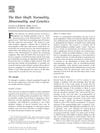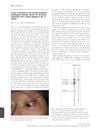 18 citations,
February 2006 in “Brain & development”
18 citations,
February 2006 in “Brain & development” A patient with Satoyoshi syndrome improved with a treatment combining several medications, including carbamazepine and methotrexate.
 17 citations,
November 2012 in “Journal of Investigative Dermatology”
17 citations,
November 2012 in “Journal of Investigative Dermatology” The document concludes that over 500 genes are linked to hair disorders and this knowledge is important for creating new treatments.
 12 citations,
May 2011 in “Dermatologic Clinics”
12 citations,
May 2011 in “Dermatologic Clinics” Hair loss in autoimmune blistering skin diseases varies and may regrow with disease control.
 31 citations,
January 1981 in “Pharmacology & Therapeutics”
31 citations,
January 1981 in “Pharmacology & Therapeutics” Oral retinoids are effective for treating severe skin disorders but have reversible side effects and risks for pregnant women.
 4 citations,
August 2018 in “Clinical Endocrinology”
4 citations,
August 2018 in “Clinical Endocrinology” Women with PCOS have more insulin resistance and are more likely to have heart-related health issues, with insulin resistance being a bigger factor than β-cell problems.
 13 citations,
February 2004 in “Clinical and Experimental Ophthalmology”
13 citations,
February 2004 in “Clinical and Experimental Ophthalmology” A baby boy with 13q deletion syndrome had eye cancer, a woman's vision improved after stopping a breast cancer drug, a man developed cataracts from using Propecia, and a rare skin disorder called Lipoid Proteinosis was discussed. Also, a tool called OCT is useful for diagnosing macular diseases.
 September 2022 in “Annals of medicine and surgery”
September 2022 in “Annals of medicine and surgery” Three siblings with a rare genetic condition had abnormal sexual development and chose different gender identities, needing surgery and therapy.
 1 citations,
November 1995 in “Postgraduate medical journal”
1 citations,
November 1995 in “Postgraduate medical journal” A Saudi individual initially identified as a girl had a genetic disorder affecting gender development.
 December 2024 in “Kırıkkale Üniversitesi Tıp Fakültesi Dergisi”
December 2024 in “Kırıkkale Üniversitesi Tıp Fakültesi Dergisi” Chromosomal microarray analysis is important for diagnosing rare genetic variations and guiding treatment.
 148 citations,
December 2018 in “Journal of autoimmunity”
148 citations,
December 2018 in “Journal of autoimmunity” Alopecia areata is an autoimmune disease causing patchy hair loss, often with other autoimmune disorders, but its exact causes are unknown.
 69 citations,
January 2013 in “Frontiers in Immunology”
69 citations,
January 2013 in “Frontiers in Immunology” The FOXN1 gene is crucial for developing immune cells and preventing immune disorders.
 29 citations,
September 2012 in “Dermatologic Clinics”
29 citations,
September 2012 in “Dermatologic Clinics” Hair disorders are caused by a complex mix of biology, genetics, hormones, and environmental factors, affecting hair growth and leading to conditions like alopecia.
 26 citations,
December 2011 in “Journal of Investigative Dermatology”
26 citations,
December 2011 in “Journal of Investigative Dermatology” New gene identification techniques have improved the understanding and classification of inherited hair disorders.
 April 2003 in “Experimental Dermatology”
April 2003 in “Experimental Dermatology” The workshop highlighted the genetic links and psychological impacts of hair loss and skin disorders.
 26 citations,
July 2019 in “Dermatology and Therapy”
26 citations,
July 2019 in “Dermatology and Therapy” The conclusion is that genetic testing is important for diagnosing and treating various genetic hair disorders.
 16 citations,
September 2008 in “Dermatologic Therapy”
16 citations,
September 2008 in “Dermatologic Therapy” CAH is a genetic disorder affecting cortisol production and causing hormonal imbalances, with treatment and diagnosis varying by form and symptoms.
 11 citations,
March 2001 in “Clinics in Dermatology”
11 citations,
March 2001 in “Clinics in Dermatology” Hair microscopy is useful for diagnosing hair disorders, but clear definitions are needed for accurate genetic analysis.
5 citations,
December 2014 in “Molecular cytogenetics” A specific genetic change is linked to mental disorders, intellectual disability, and possibly autoimmune disease in a family.
 4 citations,
November 2017 in “Scientific Reports”
4 citations,
November 2017 in “Scientific Reports” The research provides a gene-based framework for hair biology, highlighting the Hippo pathway's importance and suggesting links between hair disorders, cancer pathways, and the immune system.
 20 citations,
April 2021 in “Journal of Womens Health”
20 citations,
April 2021 in “Journal of Womens Health” Testosterone can help premenopausal and postmenopausal women with low sexual desire, but its long-term safety is unclear and it's not widely approved for this use.
 11 citations,
May 2011 in “World Journal of Pediatrics”
11 citations,
May 2011 in “World Journal of Pediatrics” The document emphasizes the importance of correctly identifying and classifying genetic hair disorders to help diagnose related health conditions.
February 2025 in “Infectious Diseases & Immunity” HHV-6 reactivation may be linked to psychiatric disorders and can improve with antiviral treatment.
 May 2023 in “Journal of complementary medicine & alternative healthcare”
May 2023 in “Journal of complementary medicine & alternative healthcare” Ayurveda's descriptions of genetic disorders align with modern genetic understanding.
 July 2019 in “Journal der Deutschen Dermatologischen Gesellschaft”
July 2019 in “Journal der Deutschen Dermatologischen Gesellschaft” A mother and daughter have a rare genetic hair loss disorder with no effective treatment.
 991 citations,
January 2011 in “Nature Reviews Endocrinology”
991 citations,
January 2011 in “Nature Reviews Endocrinology” The document concludes that PCOS is a complex disorder caused by both genetic and environmental factors, affecting women's health in various ways, and requires personalized treatment.
 118 citations,
October 2013 in “Trends in Genetics”
118 citations,
October 2013 in “Trends in Genetics” The AUTS2 gene is linked to neurological disorders and may affect human brain development and cognition.
 7 citations,
February 2010 in “British Journal of Dermatology”
7 citations,
February 2010 in “British Journal of Dermatology” A woman with a rare autoimmune disorder had a blister on her eye and unique immune reaction, which was effectively treated with medication.
 855 citations,
June 2009 in “The Journal of Clinical Endocrinology & Metabolism”
855 citations,
June 2009 in “The Journal of Clinical Endocrinology & Metabolism” The guideline recommends mental health involvement in diagnosing gender identity disorder and outlines hormone and surgical treatment protocols, emphasizing safety, informed consent, and long-term monitoring.
 49 citations,
January 2004 in “Journal of steroid biochemistry and molecular biology/The Journal of steroid biochemistry and molecular biology”
49 citations,
January 2004 in “Journal of steroid biochemistry and molecular biology/The Journal of steroid biochemistry and molecular biology” Selective non-steroidal inhibitors of 5α-reductase type 1 can help treat DHT-related disorders.
 5 citations,
January 2017 in “Endocrinology”
5 citations,
January 2017 in “Endocrinology” Genetic defects in testosterone production can cause hormonal and developmental disorders, and more research is needed to understand androgen regulation and develop safer treatments.




























